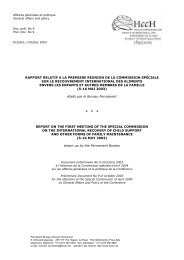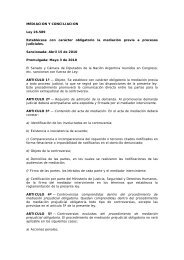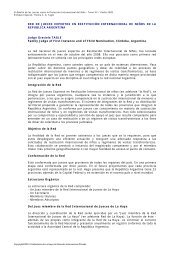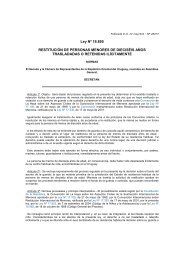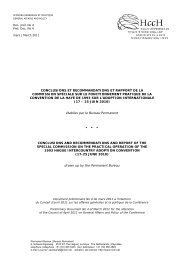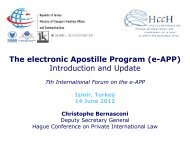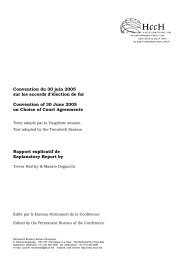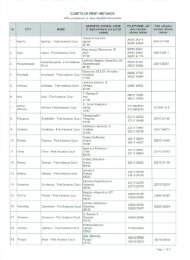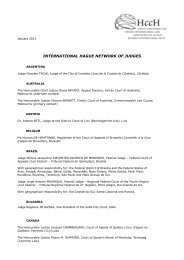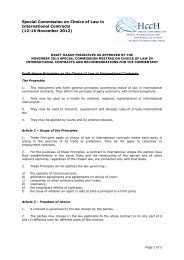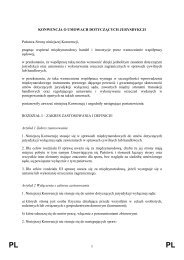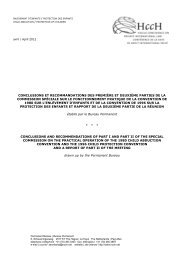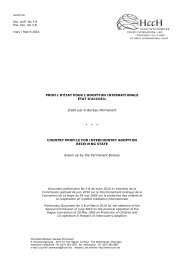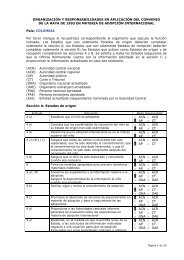aperçu des réponses au questionnaire accompagnant la ... - HCCH
aperçu des réponses au questionnaire accompagnant la ... - HCCH
aperçu des réponses au questionnaire accompagnant la ... - HCCH
You also want an ePaper? Increase the reach of your titles
YUMPU automatically turns print PDFs into web optimized ePapers that Google loves.
Question Réponse / Reply État / State<br />
Eventually, it should be decided ultimately by the Central Authority, and, in any case, restricted to cases in which<br />
the forwarding <strong>au</strong>thority has justified the addressee’s sufficient knowledge of the <strong>la</strong>nguage in which the document is<br />
drafted.<br />
We should consider dropping the trans<strong>la</strong>tion requirement only in respect of non-judicial documents. Ir<strong>la</strong>nde<br />
We believe that the criteria for determining the necessity and degree of trans<strong>la</strong>tion that is required, is ultimately to<br />
be viewed under the standard of due process. That is, so long as the document or forms have been sufficiently<br />
trans<strong>la</strong>ted into English to enable the recipient to understand the nature of the papers and the<br />
proceedings under which they have been issued, a less than complete trans<strong>la</strong>tion may be acceptable. In<br />
many circumstances the summary of the document is quite cursory and, even if trans<strong>la</strong>ted into English, may not<br />
provide adequate information to meet the minimum due process that a recipient of a service of process is entitled.<br />
Again, bec<strong>au</strong>se of the liberal use of alternative service channels for service in the United States which does not call<br />
for trans<strong>la</strong>tion, parties wishing to avoid the inconvenience of a trans<strong>la</strong>tion can do so readily. Service made under<br />
these informal vehicles, if voluntarily accepted without compulsion by the recipient, will generally be considered<br />
effective, unless expressly challenged subsequently by the recipient and under the factual circumstances presented,<br />
can be shown to have denied that party applicable due process.<br />
[F] Québec : En ce qui concerne <strong>la</strong> procédure introductive d'instance, <strong>la</strong> traduction de tous les documents doit être<br />
exigée. Dans les <strong>au</strong>tres cas, <strong>la</strong> traduction <strong>des</strong> "Éléments essentiels de l'acte" peut suffire, si le <strong>des</strong>tinataire y<br />
consent. IPE: Une traduction intégrale est nécessaire. Alberta : Non, ce n'est pas toujours nécessaire d'avoir<br />
une traduction intégrale; un résumé du contenu de l'acte devrait suffire.<br />
[E] Québec: In the case of originating proceedings, the trans<strong>la</strong>tion of all documents must be required. In other<br />
cases, trans<strong>la</strong>tion of the “Essential Elements of the document” may be sufficient if the recipient consents. PEI: Full<br />
trans<strong>la</strong>tion is necessary. Alberta: No, it is not always necessary that there be a full trans<strong>la</strong>tion; a summary of<br />
the document’s contents should be sufficient.<br />
Full trans<strong>la</strong>tion.<br />
Chine (Macao): […] A summary could raise more difficulties and doubts leading to de<strong>la</strong>ys.<br />
Ukraine: […] Otherwise, the documents can be served only if it is accepted by the addressee.<br />
The requirement for trans<strong>la</strong>tion goes into the direction of the receiving <strong>au</strong>thority “protecting” the interests of the<br />
addressee on its territory, rather then the requesting State´s obligation to observe some kind of due process in<br />
re<strong>la</strong>tion to the addressee. If that is the underlying philosophy than the document should be trans<strong>la</strong>ted in full.<br />
Etats-Unis<br />
Canada<br />
Bé<strong>la</strong>rus, Chine (Macao),<br />
Italie, Luxembourg,<br />
Pologne, Portugal,<br />
Ukraine<br />
Rép. Slovaque<br />
Yes. Koweït<br />
The trans<strong>la</strong>tion requirement should not only refer to the document to be served itself, but also to its<br />
attachments. They are an essential component of the document and must be able to be understood by the<br />
addressee just as much as the document itself. However, the Central Authority itself cannot always assess the<br />
extent and accuracy of trans<strong>la</strong>tions. Therefore, it is up to the addressee to submit a comp<strong>la</strong>int to the foreign court of<br />
any incomplete or poor trans<strong>la</strong>tions. In so far as it is being considered to deviate from Art. 7 in future by<br />
requiring the inclusion of a trans<strong>la</strong>tion of the summary on the request for service (information on the essential<br />
content of the document), and to do so contrary to the current provision of Art. 7, whilst alternatively, however,<br />
omitting trans<strong>la</strong>tions of the documents to be served, this does not seem prudent. For our reasons, reference is<br />
made to the exp<strong>la</strong>nations provided under 9.1. The forms themselves (pre-printed portion) are subject to the<br />
provisions of Article 7 of the Convention.<br />
This question should be studied more closely. However, where obligatory service is requested it is our view that it<br />
is important that the addressee understands the documents served on him. In these cases, it would not be<br />
Allemagne<br />
Norvège<br />
Page 32 of 69



